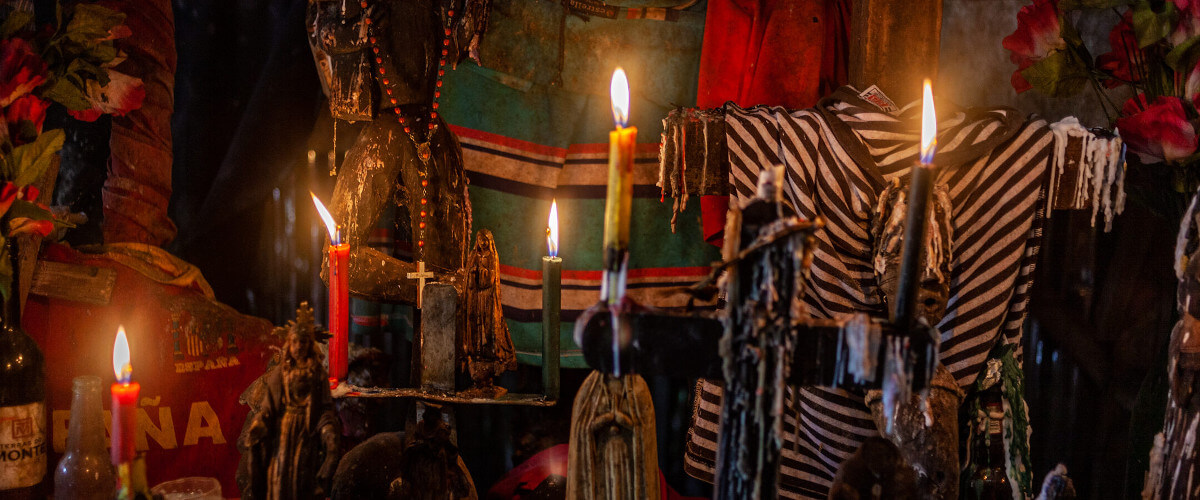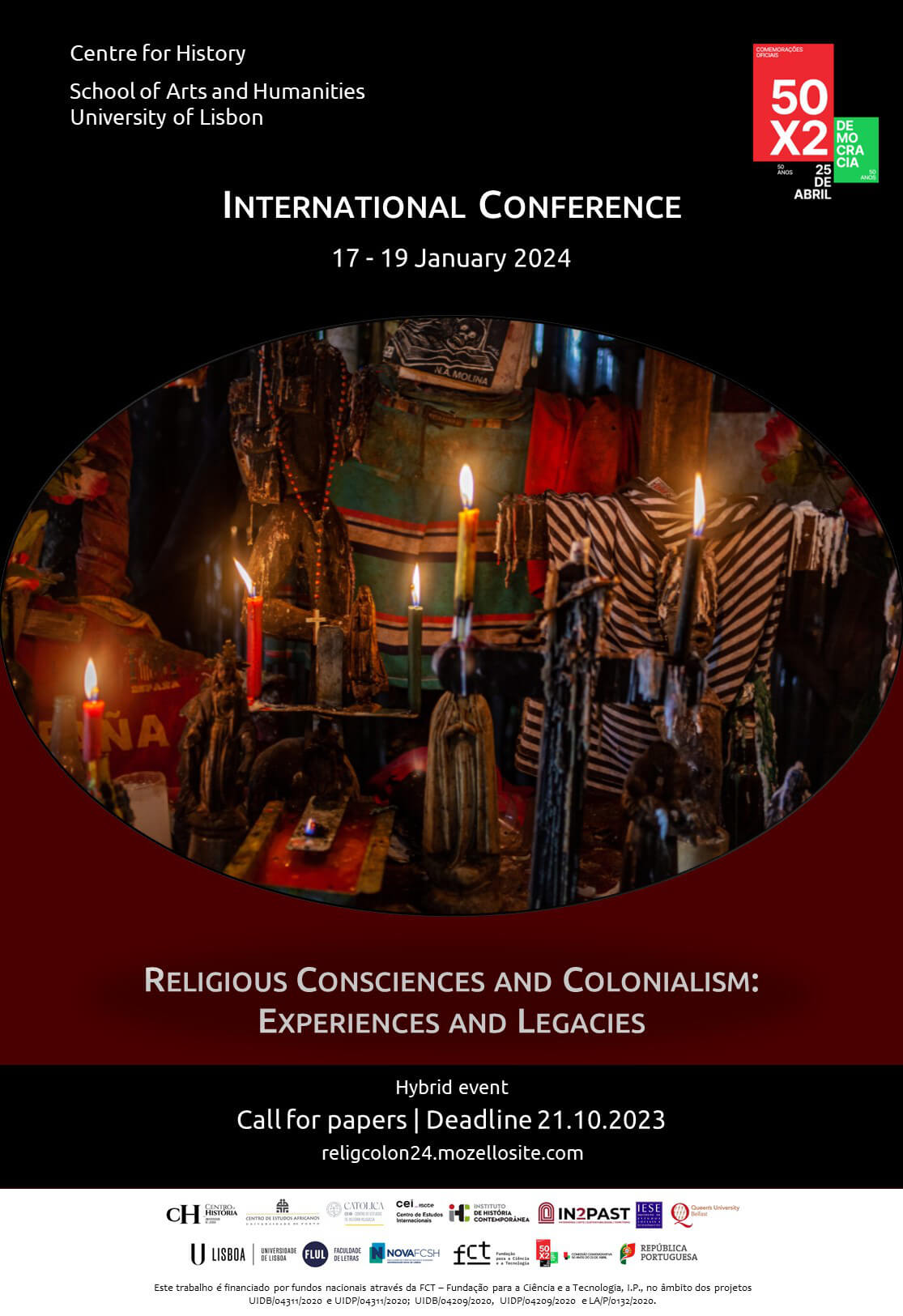january, 2024

Event Details
International congress that will explore religious figures and institutions which raised their voices and took action again colonialism and the dictatorship of the Estado Novo. Religious Consciences and Colonialism:
more
Event Details
International congress that will explore religious figures and institutions which raised their voices and took action again colonialism and the dictatorship of the Estado Novo.
Religious Consciences and Colonialism:
Experiences and Legacies
Commemorating of the 50th anniversary of Carnation Revolution, the International Conference Religious Consciences and Colonialism: Experiences and Legacies will take place at the Faculty of Humanities of the University of Lisbon between 17 and 19 January 2024. The event is organised by the Centro de Estudos Africanos da Universidade do Porto, Centro de Estudos de História Religiosa da Universidade Católica Portuguesa, Centro de Estudos Internacionais do Instituto Superior das Ciências do Trabalho e da Empresa, Centro de História da Universidade de Lisboa, Instituto de Estudos Sociais e Económicos, Institute of Contemporary History of the NOVA School of Social Sciences and Humanities, and the Queen’s University Belfast.
Part of the commemoration of the Portuguese revolution, this international conference will explore religious figures and institutions which, through the conscience and actions, raised their voices and took action again colonialism and the dictatorship of the Estado Novo. At the same time it aims at assessing the religious, social and political heritage that exists in the societies formerly colonised by Portugal, particularly in Africa.
Schedule
17 January
15:00 | PANEL 1: Práticas, discursos e suas reverberações nos séculos XVI-XIX
18:00 | OPENING LECTURE: Didier Peclard (Université de Genève), Cristianismo e formação do sujeito (pós-)colonial. Notas sobre a historiografia da dimensão religiosa do Estado em África
18 January
9:00 | PANEL 2: Religião e colonialismo português I
11:00 | PANEL 3: Religião e colonialismo português II
14:00 | PANEL 4: Resistências religiosas ao colonialismo
16:00 | PANEL 5: As igrejas ditas “estrangeiras” nos espaços coloniais
19 January
9:00 | PANEL 6: A diocese e o bispo da Beira
11:00 | PANEL 7: Consciências religiosas e ruturas com o colonialismo
14:00 | PANEL 8: A reconstrução político-social e as revivescências religiosas
16:00 | CLOSING SESSION
>> Full programme (Portuguese) <<
Call for papers
The forms of religious consciousness – from the local and ancestral to those that arrived in Africa by the hand of the colonists – can contain a synthesis of human history. In the colonial context, religious consciousnesses had to deal with themselves, that is, with their usefulness in shaping the relationship between colonists and the colonised, in multiple colonial situations. Colonialism and the changes of the post-colonial period have called into question the universalism of the message of some religions, particularly those that were the vehicle of so-called Western values, which none the less played a relevant role in the progressive affirmation of the colonised.
In different contexts and under different forms, at the initiative of European and African missionaries, catechisation and conversion were, inadvertently or not, vehicles for creating individualistic and, subsequently, new political consciousness, most often anti-colonial. Even if not oriented towards nationalist struggle, anti-colonial resistance in the name of religious imperatives – preached by African religious – had a significant role in the corrosion of settler certainties. Because of the African handling of religious messages, colonial domination (and also the forms of subjection in force after independence) did not always correspond to the spiritual subalternisation of Africans or the colonised.
Still, religious consciences or visions have not ceased to be instrumentalised, nor have they ceased to be disparaged by nationalist leaders, who, imbued by an unholy faith in their own political slogans, accused them of being a vehicle of alienation and subjection.
After coming under fierce attack from heralds of the new liberating creeds – like ideologies – religious consciences survived political vicissitudes and trials, while ideologies fell heavily. Not infrequently, political leaders pushed ideology aside, exchanging it for pragmatism or authoritarianism, supported, whenever possible and credible, by the invocation of the divine.
Nowadays, as a political trump card in various parts of the world, religious beliefs have conditioned, in multiple forms, political designs in independent Africa, especially in the former Portuguese colonies. If, to some extent, religious beliefs and consciences depend on the contingencies of the drift of societies, they are also based in their historical experience, sometimes against colonialism.
For this International Conference – Religious Consciences in the Face of Colonialism: Experiences and Legacies – we will accept proposals which reveal the multiplicity of religious experiences in the colonial context, and their political and social uses leading to various attitudes, from acceptance of to opposition to the colonial situation.
We will also accept proposals that evaluate religious legacies in post-colonial societies where, frequently, political actors and institutions have tended, implicitly, to replicate procedures similar to the religious ones they yse to criticise, to achieve the imposition of their truths.
*
Paper submissions, in *.docx, between 180 to 200 words, should be sent to religcolon24@mail.com by 1 21 October 2023 [New!].
No registration fee; the costs of participation are at the expense of the participants.
*
Working Languages: Portuguese, Spanish, French, and English
Thematic axes
- Religious consciences and wars
- Independences and ideologies versus religious beliefs and practices
- Church in support of colonialism – from civilization to Lusotropicalism
- Typologies of religious consciousness in a colonial situation
- Religious criticism of Portuguese colonialism
- Religious consciences and liberation/decolonization wars
- The Portuguese bishops and colonialism
- Portuguese colonialism, faith and independence: the case of Bishop D. Sebastião Soares de Resende
- Liberation movements, churches and religion
- The Church in the transition to independence
- Memories and legacies of religious practices in a colonial context and colonialism in the current churches
>> 📎 Download the call for papers (PDF) <<
Organising committee
Augusto Nascimento (CH-ULisboa)
Eric Morier-Genoud (Queen’s University Belfast)
Magdalena Bialoborska Chambel (CH-ULisboa)
André Morgado (secretariado) (CH-ULisboa)
Scientific committee
Ana Mónica Fonseca (CEI — Iscte-IUL)
Augusto Nascimento (CH-ULisbon)
Carlos Almeida (CH-ULisbon)
Chapane Mutiua (UEM)
Conceição Neto (UAN)
Didier Péclard (Université de Genève)
Eric Morier-Genoud (Queen’s University Belfast)
Éva Sebéstyén (CEAUP)
Eugénia Rodrigues (CH-ULisbon)
Fernando Tavares Pimenta (IHC — NOVA FCSH / IN2PAST)
Iracema Dulley (PPGAS | UFSCar)
João Miguel Almeida (IHC — NOVA FCSH / IN2PAST)
José da Silva Horta (CH-ULisbon)
Marçal Paredes (PUCRS)
Marcelo Bittencourt (NEAF, UFF)
Maria Inácia Rezola (IHC — NOVA FCSH / IN2PAST)
Miguel Bandeira Jerónimo (CES-UC)
Natalia Zawiejska (Institute of Religious Studies, Jagiellonian University in Krakow)
Paulo Fontes (CEHR-UCP)
Pedro Aires Oliveira (IHC — NOVA FCSH / IN2PAST)
Ruy Blanes (CRIA ISCTE)
Salvador Salvador Forquilha (IESE)
Teresa Cruz e Silva (UEM)
Victor Barros (IHC — NOVA FCSH / IN2PAST)
Photograph © José Chambel
Time
17 (Wednesday) 3:00 pm - 19 (Friday) 4:30 pm
Location
School of Arts and Humanities - University of Lisbon
Alameda da Universidade — 1600-214 Lisbon
Organizer
Several Institutions

